Lay local leaders share ‘personal histories’ connection with church
By Amanda Murthy
The Archdiocese and University of Notre Dame Australia (UNDA) directed the spotlight on three local influential leaders, who last month shared their experiences and outlooks on their journey with the Catholic Church. The history symposium themed ‘Personal Histories’ was held on Wednesday, 22 October at the UNDA Fremantle campus.
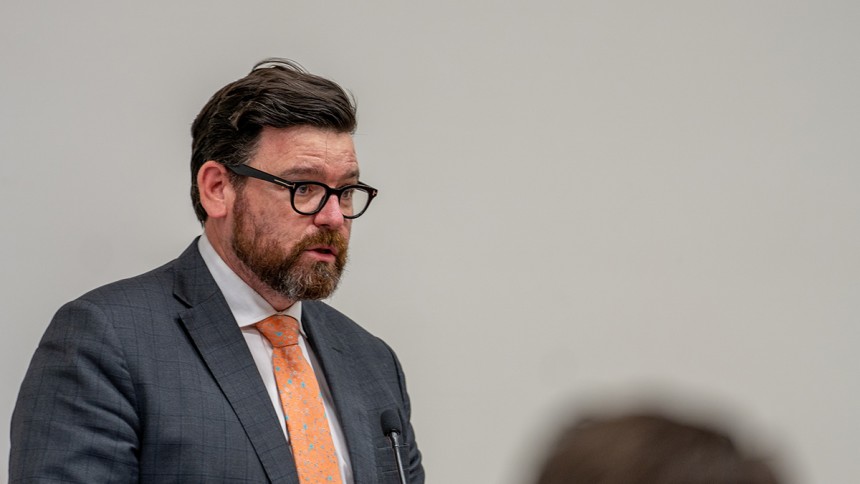
Chief Justice of Western Australia the honourable Peter Quinlan SC said his hopes for the future of the church is a Eucharistic vision, as it is a vision that must unite the Presence of Christ in our Liturgy with the Presence of Christ in our world, at the history symposium held at the University of Notre Dame Australia Fremantle campus, on 22 October. Photo: Michelle Tan.
The guestlist included Perth Auxiliary Bishop Don Sproxton, Bunbury Bishop Gerard Holohan, Archdiocese Vicar General and Vicar for Effective Communications Father Peter Whitely, Monsignor Michael Keating, representative superiors of religious orders, Catholic Education Western Australia Executive Director Dr Debra Sayce, UNDA Senior Lecturer in Theology Dr Angela McCarthy, UNDA trustees, governors, benefactors, staff, and students.
Upon welcoming guests, Archdiocese of Perth Archivist and Director Odhran O’Brien explained that the purpose of the event was to encourage discussions into the history of the Catholic church and its place in contemporary society, especially in the lead up of the First Assembly of the Plenary Council, which took place from 3 to 10 October.
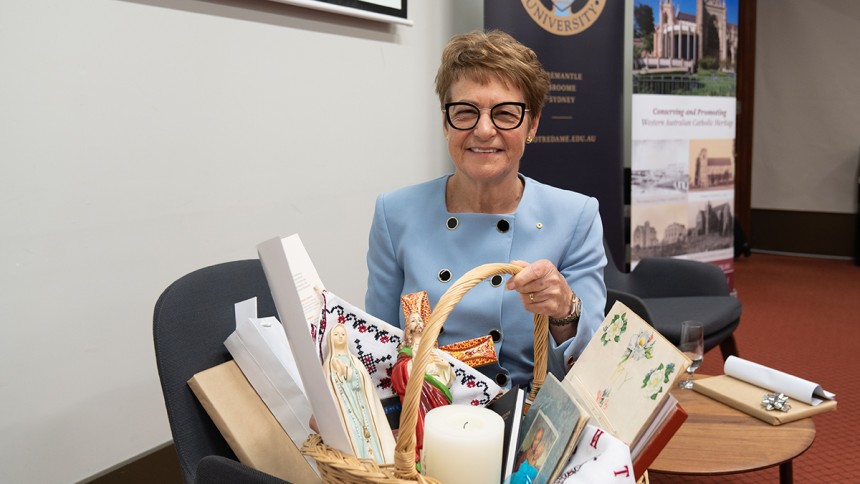
Ukrainian-Catholic St John of God Healthcare Chair of Trustees Eva Skira AM attributed her Catholic faith to a triangulation of formation, stewardship, and vocation at the history symposium held at the UNDA Fremantle campus, on 22 October. Photo: Michelle Tan.
“There has been a long history within the lay initiatives in promoting the engagement with the church in WA, from as far back as the 1860s’.”
Speakers Chief Justice of Western Australia the honourable Peter Quinlan SC, the University of Notre Dame Western Australia Vice Chancellor Professor Francis Campbell, and St John of God Healthcare Chair of Trustees Eva Skira AM taking turns, responded to two personal questions – “What has been your experience of faith and church/How has the church shaped who you have become,” and “What is your hope for the future of the church/ What is the hope for the church within your life?”
Chief Justice Quinlan shared on the influence that the religious and lay Catholic community played in the life of his closest and dearest family members.
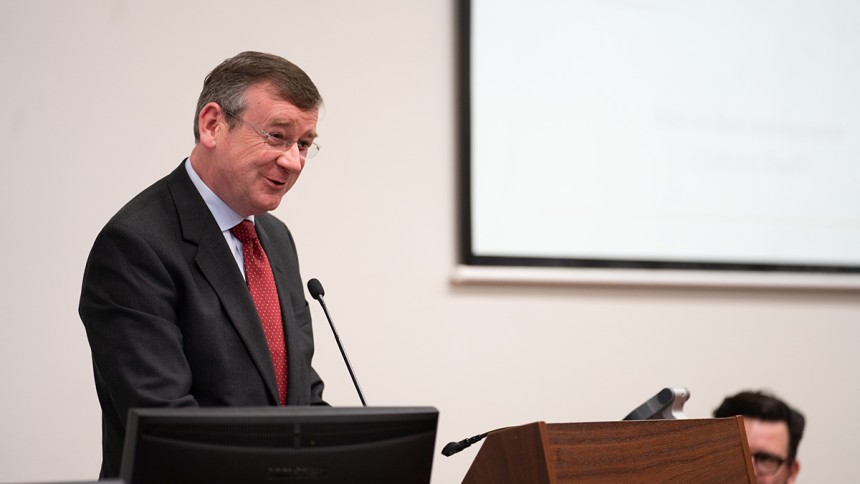
UNDA Vice Chancellor Professor Francis Campbell spoke about how his Catholic school and parish environment in his birth country in Northern Ireland, protected and shaped him to be the leader he is today at the history symposium held at the UNDA Fremantle campus, on 22 October. Photo: Michelle Tan.
“My hope for the future of the Church, my hope for the Church as it continues to shape my life, is as a matter of vision, a Eucharistic vision, as it is a vision that must unite the Presence of Christ in our Liturgy with the Presence of Christ in our world,” Chief Justice Quinlan cited.
“This Eucharistic vision trains us to see through the surface of things and past the ordinariness of things. It trains us to understand that things are not always as they appear and that the Presence of Christ often lies hidden in plain sight and in places where we cannot (or do not want) to see it.
“How important it is that we bring a Eucharistic vision to the world, to be able to see the Presence of Christ in all the brokenness and contradictions in our world. To see that Christ plays in all of it,” he concluded.
Ms Skira attributed her Catholic faith to a triangulation of formation, stewardship, and vocation. Born into a refugee Ukrainian Catholic family in Tasmania, Ms Skira is hopeful that the church will continue to influence future generations in their early education and family life, the way she was influenced.
“Committed teachers, engendering a future love of the Church, knowledge of the Church scriptures, its theology, the sacraments, the Eucharist. I think we are blessed to have a strong Catholic education sector in Australia. It is the greatest gift we can give to future young generations. We need to keep it and grow it.”
Prof Campbell spoke about how his Catholic school and parish environment in his birth country in Northern Ireland, protected and shaped him to be the leader he is today.
“….Without the church I could not have walked the path that I walked. The influence of priests in the parishes and schools, religious sisters in schools, it was a protected place for me and those in my era – outside the school it was a dangerous place.
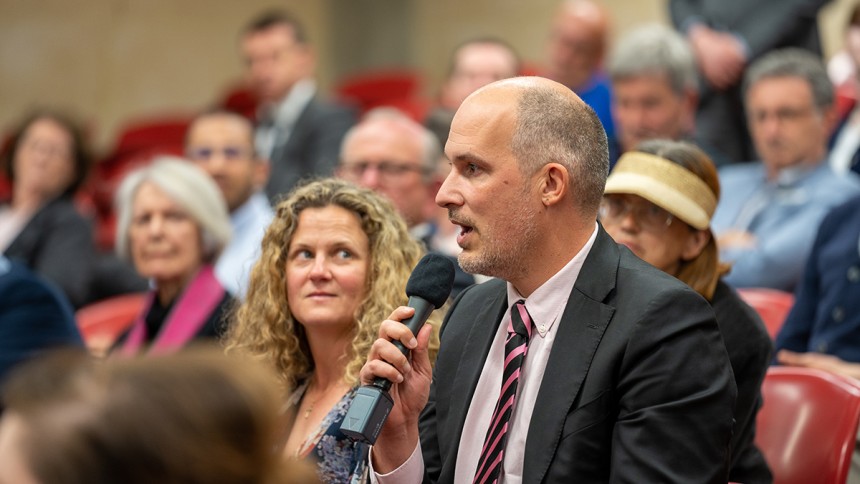
Three local leaders shared their faith experiences and hopes for the future of the Catholic church at a history symposium themed ‘Personal Histories’ at the UNDA Fremantle campus, on 22 October. Photo: Michelle Tan.
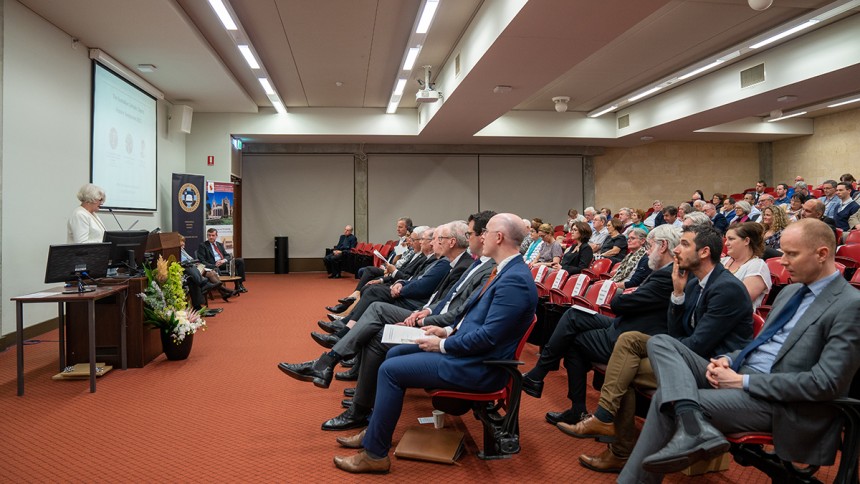
Three local leaders shared their faith experiences and hopes for the future of the Catholic church at a history symposium themed ‘Personal Histories’ at the UNDA Fremantle campus, on 22 October. Photo: Michelle Tan.
“My faith taught me how to never judge a person, even in the harshest conditions…when you walk in the footsteps of the other, your mind is opened, you come across good people and you see their desire for good and for healing. And peace takes people of goodwill on faith on all sides.
“My hope for the future of the church is that it transforms lives, I hope the church is always prophetic to people and the world… that it never ceases to offer hope, mercy and redemption, in a time in the world when society is very keen on the idea of ‘one strike and you’re out.’ I pray that the church would never give up on those who fall into sin, because the world seems to have given up on that.”
At the conclusion of the testimonies, attendees were given the opportunity to ask questions related to the topics discussed.
